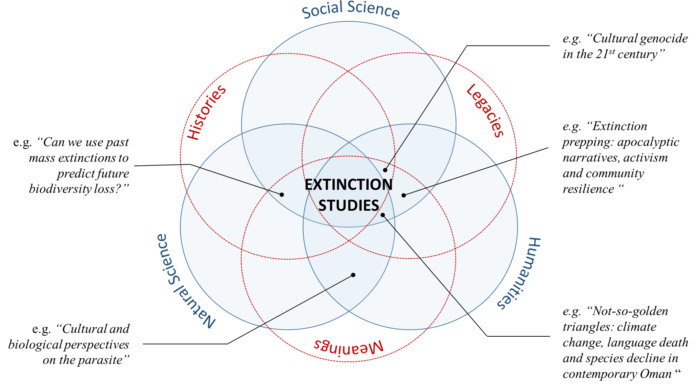About

The aim of the programme is to create a lasting platform for future training in Extinction Studies that provides substantial research and employment opportunities for doctoral researchers, both in the UK and elsewhere.
Extinction Studies, as it is currently conceived, tends to be either biologically or socially/ culturally oriented; this programmes seeks to revolutionize the field by combining elements of both. The main question we set out to ask is what extinction means – biologically, culturally, socially – in contemporary contexts of global crisis: the decline of species, the death of languages, the seemingly inexorable deterioration of already vulnerable human societies and natural ecosystems. Further questions arise from this. What is the future of life in a time of mass extinctions? What is our place in, and what are our obligations to, a more-than-human world: one that we humans share with a multitude of other species whose lives are inextricably entangled with our own? What are the different meanings of extinction in different social and ecological contexts, and what stories and narratives, as well as everyday material practices, are needed to cope with the unprecedented scale of loss? Can extinction be forestalled, or even reversed, and what are the consequences of such measures? What legacies does extinction leave us with, and what does it tell us about the temporal processes – generational change, the death-life continuum – that it catastrophically interrupts?
Extinction Studies is a field that by definition crosses conventional disciplinary boundaries, combining the work of both arts- and science-based researchers, while it is also one that by definition attracts the young, on whose own futures the future health and biodiversity of the planet depend. It would be mistaken, however, to see Extinction Studies as a field that is directed inexorably towards the future. On the contrary, it requires a greater understanding of the past or, better, multiple pasts: the histories that underlie human encounters with (other) animals; the histories that underscore particular nations’ engagements with industrial modernity, or particular peoples’ understandings of the natural world; the still longer histories that inform, and indeed precede, human beings’ presence on Earth. In this and other ways, Extinction Studies is not just a study of loss, or of the many different ways that we might seek in future to counteract it; it is a study of temporal processes, not least the grand narrative of evolution itself. Extinction Studies, in sum, is an inclusive field even as its subjects are cruelly excluded from the future; and it is a field that demands sharpened historical awareness even as it subjects are prematurely consigned to the past. Finally, it is a field that actively requires the bringing together of knowledge from different places, different times, and different research areas – a field that is as alive as it gets even as its subjects have reached the narrative endpoint of their lives.
Disciplines in the programme might include biology, communication and media, ecology, environmental social science, geography, history, linguistics, literary studies, palaeontology, philosophy, political science, religious studies and sociology, which are also the combined disciplines represented by members of the core supervision group. Interdisciplinary research being embedded within the programme, students will be expected to work across at least two different disciplines, supported by co-supervisors chosen from different disciplinary backgrounds.

Researchers will be expected to work within one or more of the programme’s crosscutting themes, which are provisionally seen as falling into three broad categories, Meanings (C1), Histories (C2) and Legacies (C3). The first of these themes recognizes that extinction can mean different things in different contexts such as species loss, language death or cultural genocide, and that the term is not necessarily as definitive or incontrovertible as it sounds. The second acknowledges that extinction has (a) a long history that pre-dates the human settlement of the planet, and (b) multiple histories that potentially require a radical rethinking of standard measurements of chronological time. The third asks what is left after extinction hits, following on from the view that extinctions are drawn-out processes that involve ripple effects that last well after death, that they produce ‘afterlives’ of their own, and that extinction indicators long precede actual extinctions. All three themes recognize the twin imperatives of (a) preventing extinction and (b) learning from past extinctions, but also acknowledge that there is an imaginative as well as a material (physical) dimension to extinction that potentially enables us to rethink the ways we live in and act upon the planet, as well as to consider new ways and forms of life. By working within/across these themes, researchers will have the chance to work together, and a fortnightly seminar series will be arranged for this purpose, allowing them to share their ideas with national and international experts in the field as well as giving them opportunities to present their latest work.
For more information about the programme, contact the programme convenor, Prof Graham Huggan (g.d.m.huggan@leeds.ac.uk).
For further information on scholarships commencing in October 2022, see the Postgraduate Scholarships website.
